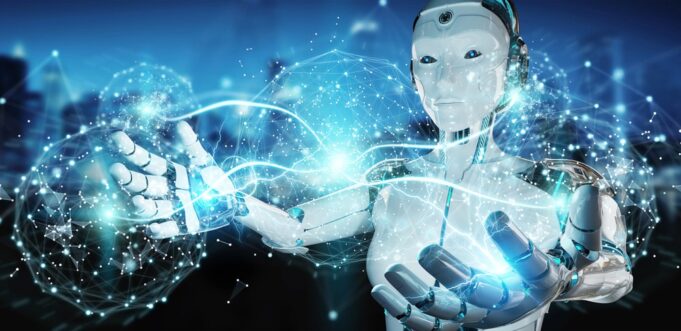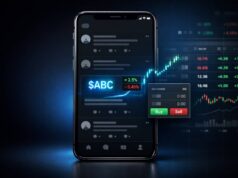Coinbase, one of the leading cryptocurrency exchanges in the world, has completed its first-ever AI-to-AI cryptocurrency transaction. This landmark event marks a major step forward in the convergence of artificial intelligence (AI) and blockchain technology. Two AI agents, each equipped with crypto wallets, executed a transaction autonomously on the Base network, a Layer-2 solution built by Coinbase. This transaction involved one AI agent purchasing tokens from another. It was the first time that autonomous machines exchanged crypto without any human intervention.
This development highlights the potential of AI to operate independently within the blockchain ecosystem and also lays the groundwork for broader applications across various industries. As AI and decentralized finance (DeFi) continue to converge, the integration of these technologies could dramatically reshape sectors such as e-commerce, logistics, and autonomous vehicles. Machines could make independent decisions and conduct financial transactions without human oversight.
A New Era for Autonomous Agents
The ability for AI agents to autonomously manage crypto wallets and execute transactions is a breakthrough that could have far-reaching implications. Traditionally, AI systems have been limited in their capacity to conduct transactions, as they lacked access to traditional financial infrastructure like bank accounts. However, these agents can now operate independently with the advent of blockchain and cryptocurrency. They can use digital wallets to manage and trade tokens.
In this historic transaction, one AI agent used crypto tokens to purchase AI tokens, which are essentially strings of data designed to improve machine learning algorithms. This capability opens up a new frontier in machine-to-machine (M2M) interactions. AIs could autonomously manage resources, make purchases, and complete complex tasks such as booking services or acquiring digital goods.
Coinbase’s CEO, Brian Armstrong, pointed out that this is only the beginning. He envisions a future where AI agents, armed with crypto wallets, will be able to transact not only with each other but also with human-operated systems and merchants, creating a new financial ecosystem that is global, fast, and cost-effective. “AI agents cannot get bank accounts, but they can get crypto wallets,” Armstrong stated, underscoring the unique advantage that blockchain technology offers to AI systems.
Commercial and Industrial Implications
The implications of AI-driven blockchain transactions extend well beyond the realm of finance. The ability of autonomous agents to make decisions and execute trades opens up new possibilities across a wide range of industries.
In e-commerce, AI agents could manage online stores, handling everything from inventory management to customer service without human input. Autonomous systems could use cryptocurrencies to make real-time purchases of supplies, conduct market analysis, or optimize pricing strategies based on consumer data, driving efficiency and reducing the need for human intervention.
In logistics, AI-driven systems could streamline supply chains by autonomously managing the movement of goods. They could optimize routes, and even negotiate freight prices with transport providers – all in real time. With crypto-enabled AI, machines could execute payments instantly and globally, removing friction from cross-border transactions.
Meanwhile, autonomous vehicles could benefit from this technology by managing their own maintenance schedules, paying for repairs, or refueling. Self-driving cars could interact with charging stations, and pay for electricity or fuel through decentralized platforms. This would facilitate a truly self-sufficient network of autonomous vehicles capable of managing their operational costs without human intervention.
Challenges and the Path Forward
While the potential for AI-driven blockchain transactions is immense, several challenges remain. Security concerns are paramount, especially when considering that AI systems handling valuable crypto assets could become targets for cyberattacks. Ensuring that these systems are secure from exploitation will be critical as they become more integrated into the economy.
Furthermore, regulatory considerations are likely to emerge as AI-to-AI transactions become more common. Governments and regulators may need to establish new frameworks to address the legal status of autonomous agents. How would they tax their activities? Who is liable for their actions? Resolving those issues will play a major role in determining the pace at which AI and blockchain technology evolve together.
>>> Read more: 10 Unconventional Blockchain Uses You’d Be Surprised About
Coinbase’s first AI-to-AI crypto transaction represents a turning point in the evolution of blockchain and artificial intelligence. As autonomous systems gain the ability to operate independently in the digital economy, the potential for transformative change across industries is clear. From logistics to autonomous vehicles, the future of machine-driven commerce is on the horizon. The convergence of AI and blockchain is leading the way. As these technologies mature, the world may soon see an economy where machines make decisions, manage resources, and conduct transactions with little to no human intervention – ushering in a new era of digital innovation.
Readers’ frequently asked questions
How do AI-to-AI crypto transactions actually work?
In an AI-to-AI cryptocurrency transaction, two autonomous AI agents – software programs designed to carry out specific tasks -execute a financial exchange without any human intervention. These agents are equipped with crypto wallets, enabling them to send and receive digital assets. In the case of the historic Coinbase transaction, one AI agent used crypto tokens (likely USDC) to purchase AI tokens from another. The Base network, a Layer-2 blockchain developed by Coinbase, facilitated the transaction. The AI tokens involved are data strings that are valuable for machine learning tasks. AI agents can use them to improve their algorithms. The ability for AI agents to autonomously manage digital assets like cryptocurrencies opens up new possibilities for machine-to-machine transactions. It would eliminate the need for human management of simple financial tasks.
What are the potential real-world applications of AI-to-AI blockchain transactions?
The potential applications of AI-to-AI blockchain transactions extend across multiple industries. In e-commerce, AI agents could autonomously manage everything from inventory to customer service, enabling online stores to operate with minimal human input. In logistics, AI agents could streamline supply chains by autonomously managing shipments, routes, and payments in real time. Autonomous vehicles could use this technology to handle their own maintenance, paying for fuel or electricity without human involvement. Additionally, in decentralized finance (DeFi), AI agents could automate trading and portfolio management, responding to market changes instantaneously. As machines become more capable of handling financial tasks independently, industries reliant on data-driven decision-making could see huge efficiency gains.
What are the challenges and risks associated with AI-to-AI crypto transactions?
While the potential for AI-to-AI transactions is immense, several challenges and risks need to be addressed. One major concern is security: AI agents managing valuable crypto assets could become targets for hackers. Ensuring these systems are secure and resilient against cyberattacks will be critical as they gain more control over financial resources. Another challenge is regulatory oversight. As autonomous agents engage in financial activities, new legal frameworks may be needed to define their rights and responsibilities. Governments will likely need to address issues such as taxation, liability, and how to monitor and regulate transactions that occur between machines. Finally, there’s the ethical concern of allowing machines to make decisions that could have significant financial or societal impacts. That raises questions about accountability and control.
What Is In It For You? Action Items You Might Want to Consider
Explore AI-Driven Trading Solutions
Given that AI agents are now capable of conducting autonomous crypto transactions, it might be time to explore how AI-driven solutions can optimize your trading strategies. AI can analyze vast datasets in real time, potentially making more informed decisions than human traders. You could start by incorporating AI tools into your portfolio management, allowing automated trading algorithms to execute based on market trends. Keep an eye on platforms like Coinbase, which may soon introduce new AI-enhanced tools for retail traders following this breakthrough.
Monitor the Growth of AI Tokens and Related Assets
The transaction Coinbase executed involved the exchange of AI tokens, which are data strings designed to improve machine learning algorithms. As the integration of AI and blockchain grows, demand for AI-related tokens could increase. Traders should start researching tokens tied to AI technologies and machine learning developments, as they may offer significant opportunities. Consider setting up alerts for projects and platforms like Fetch.ai, SingularityNET, or other AI-focused blockchains that could see increased traction in light of these developments.
Assess Long-Term Investment in AI-Blockchain Convergence
With AI-to-AI transactions becoming a reality, industries beyond finance—such as logistics, e-commerce, and autonomous vehicles—are likely to adopt this technology. Traders with a long-term view should consider diversifying their portfolios to include assets that could benefit from this convergence. Blockchain platforms focused on supporting machine-to-machine (M2M) transactions, smart contracts, and AI-driven systems could see increased institutional interest and investment. Watching for developments from Coinbase and other major exchanges could offer clues on where this technology is heading and which sectors are poised for growth.










